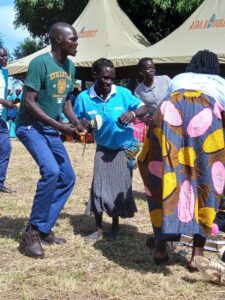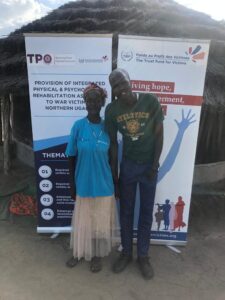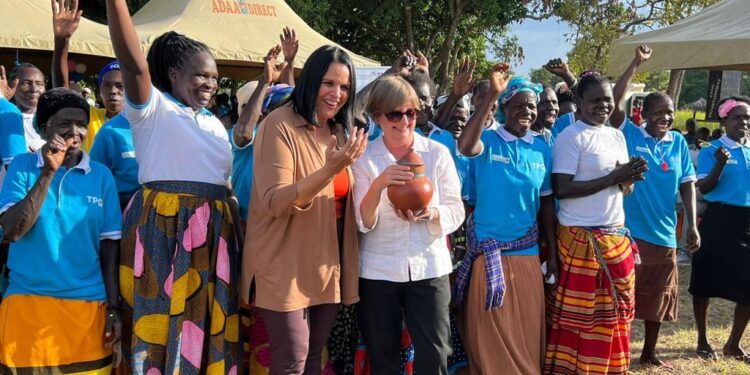By Janet Sankale in Gulu, Uganda
During the Joint Monitoring Mission to Uganda organised by the Embassy of Ireland in The Hague, and the Trust Fund for Victims, with the assistance of the Embassy of Ireland in Kampala, the group visited Pader district, Acholi sub-region, some 133 kilometres by road, east of Gulu city, and got to hear the stories of healing, recovery, and support from members of the affected communities.
The dance was vigorous, the dancers’ faces animated. They appeared happy to welcome their guests, who had travelled thousands of kilometres to visit them.

Albert Ocen Wokorach, a father of seven, gave himself up to the dance, singing along to the melodious song. He was determined to give his all to welcome the special visitors; the delegates of the Joint Monitoring Mission to Uganda to review the activities of the Trust Fund for Victims (TFV). Ocen who hails from Wajoli, Patongo, in Agago district, welcomed the guests in the Laguti community neighbourhood of Pader district. This was an important mission because the last time it had been undertaken was five years ago, in 2017.
Dressed in a green shirt, blue trousers, and brown shoes, Ocen has reason to be joyful on this occasion; he is celebrating the activities and is not ashamed to admit that he is a beneficiary.
“My life is different now; it is worth living. I have a lot of friends now and I can interact with other people. I can enjoy life like any normal person.”
He is at pains to express his gratitude, telling Journalists For Justice (JFJ): “I urge TPO Uganda and TFV to continue their work so that more people like me can benefit.”
He is referring to Transcultural Psychological Organisation (TPO) Uganda, the Trust Fund for Victims (TFV) implementing partner for its activities in several districts of northern Uganda.
He explains how TPO Uganda staff reached out to him through other community members when he was at one of the lowest points in his life and offered counselling to help him cope with his situation.
Ocen has not always been happy, at least not during the years since he had a personal encounter with the fighters of the dreaded Lord’s Resistance Army (LRA), whose viciousness and cruelty to ordinary citizens are legendary and have shocked the world. He bears the evidence of the brutality in the scars on his face and body.
But he has refused to be defined by his traumatic past.
“Look, I am happy; my body is okay and I feel my life has changed.”
Ocen is full of joy. And judging from the scars on his face, it is a wonder that he manages to express such cheerfulness.
He was among the countless Ugandans who endured horrific violence during the 20-year civil war between their government and the LRA.
Ocen’s upper lip, ears, and fingers are all missing. He recalls the day his life changed, on February 20, 2003, as if it was yesterday. His story is one he seems so used to telling that there is no visible sign of sadness or fear as he recounts it.
He was on his way home from working on the farm at about 2pm. His mind was on the lunchtime meal no doubt waiting for him at home and he did not expect to be kidnapped by LRA soldiers and taken to their camp in the bush.
At the time, the government of Uganda had ordered the people in the northern region into camps as a way of protecting them from the increasingly vicious attacks of the LRA while at the same time trying to resolve the problem of the rebel group.
The teenager Ocen, still in primary school, had heard stories of the vicious LRA fighters and had seen some of the survivors of their cruelty in the camp. He was terrified because he realised that he had just become a prime candidate of the fighters’ cruelty.
“They told me that the government has taken everybody to the camps and that people were not allowed outside the boundaries of the camps,” Ocen narrated.
After holding him for two days, the fighters cut off his upper lip, ears, and fingers, and told him to go back and inform the people about the consequences of straying from the camp borders.
Maiming was a tactic used by the LRA to instil fear and punish people.
“I ran as fast as I could because they had threatened to kill me if they captured me again. I lost my breath, my heart was beating fast. I must have fallen down, unconsciously, because I recall getting up and keeping on moving.”
He met a convoy of vehicles along the road and was rescued and taken to Kalong hospital.
“For six months I lay in bed. The treatment and conditions in the hospital weren’t the best. I was later transferred to Mulago National Referral Hospital, where I fully recovered.”
Crippled and disfigured, Ocen returned to school. He was in Class Seven at the time of the attack.
“I got the second grade and was admitted to secondary school. I later sat for my senior school examination and came back home.”
He eventually got married, but life was still hard for him.
“I used to stay at home. I never used to go out or associate with other people. My friends shunned me. People talked about me and laughed at me because of the way I looked. I just wanted to be left alone.”
Through the Community Support Structure under TPO Uganda, and with support from the TFV project, he was identified for assistance last year. He got enrolled for psychoeducation, was assessed, and got attached to Wajoli (meaning “we welcome you”) counselling group.
The group is composed of 15 beneficiaries who share similar challenges.
According to TPO Uganda, Ocen benefited from the cognitive behavioural therapy (CBT) sessions, which empowered him with knowledge of his rights and built up his confidence to cope with traumatic situations.
In addition, he joined the Village Savings and Loan Association (VSLA) from which he received financial assistance to engage in income-generating projects, including poultry keeping, retail, and produce business. This has significantly improved his ability to take care of his family.

Unlike Ocen, Santa Ajok, appeared disinclined to dwell on that horrific ordeal in her life. Sitting cross-legged outside an oval-shaped, grass-thatched mud hut in Laguti community, Pader district, Ajok recalls the worst day of her life. At the time, like many people in northern Uganda, she was living in the camps.
One day as she went to fetch food, she met a group of LRA rebels and they kidnapped her. She was three months pregnant at the time.
“They took turns raping me until I was unconscious.” The rebels left her bleeding profusely and vanished.
Ajok does not say much about how she went to hospital or got home. Perhaps she does not remember. But she remembers the pain.
She told JFJ that she had a miscarriage and later developed a fistula and could not control her urine, which was constantly seeping out.
“I could not go to the market and associate with other people. I was smelling so bad. I gave up on life and started having suicidal thoughts,” she narrated.
She was lucky to be referred to TPO Uganda through the help of the local council.
The organisation took her to Gulu Referral Hospital, but the hospital was not equipped to treat her condition and referred her to Soroti hospital, where she spent six weeks. TPO Uganda helped her get back home and followed up on her treatment until she was fully recovered.
“I am happy with my life now, although I am weak and can only do a few things.”
Still, she has to look after her family because she is the sole breadwinner as her husband is confined to a wheelchair.
Ocen and Ajok are among the thousands for whom the conflict impeded physical, mental, social, and economic recovery. After the war ended, the survivors returned home, but going back to normal life was difficult. They had to endure stigma, depression, trauma, and isolation.
The two are among the lucky ones who have been given another chance to build a new life for themselves, thanks to the assistance of organisations such as the TFV and TPO Uganda.
For the past eight years, the TFV has funded TPO Uganda to enable the organisation to provide integrated physical and psychological rehabilitation assistance to war victims in northern Uganda.
The projects aim to help victims of the LRA’s atrocities to recover from poor mental health and psychological distress, as well as gain access to surgical and medical rehabilitation for their physical injuries.
TPO Uganda operates in Agago, Gulu, Pader, Oromo, and Kitgum districts. It has empowered communities and strengthened their coping abilities to deal with mental health challenges and other daily stressors through holistic services to enable them to take control of their lives. It has recorded more than 30, 000 beneficiaries.
The organisation facilitates access to rehabilitative, surgical, and medical services, as well as providing mental health services and psychosocial support for victims.
TPO Uganda also empowers war victims to get access to household-strengthening economic support as well as strengthening coordination, promoting peaceful co-existence, and developing referral pathways among selected service providers in the districts.
Robert Okumu, the chairman of Laguti sub-county, told Escalate Media Africa, which was filming the function during the Joint Monitoring Visit in Pader district, that although the fighting is over, the effects of war are still on.
“We have people who are not physically okay.”
Some people have been living with bullets and bomb splinters in their bodies for over 20 years. He further stated that through TPO Uganda, with the support of the TFV, victims have benefited from rehabilitation.
The TFV began its assistance programme in the Gulu region in northern Uganda in 2008. According to the organisation, the assistance provided to victims includes medical rehabilitation, psychological rehabilitation, and livelihood support.







